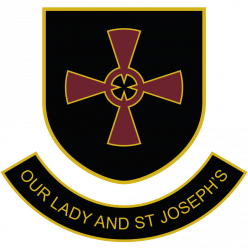Our Lady & St. Joseph’s Primary School complies with the Education (Additional Support for Learning) (Scotland) Act 2004 as amended by the Education (Additional Support for Learning) (Scotland) Act 2009.
North Lanarkshire Council’s policy is contained within “Support for Learning Policy into Practice 2”, a copy of which is available in the School. The school has a Support for Learning Policy, available from the school on request, which is consistent with North Lanarkshire Council guidelines.
Sometimes children experience barriers to their learning. This can take many forms and may be temporary or need more intervention over a sustained period of time. Sometimes children need stretched and challenged in their learning and this need must also be addressed. Children are identified by staff as having a particular need. Then we follow Learning and Leisure Services staged intervention process to ensure we are providing the correct levels of support and accessing resources appropriately. There are three levels of staged intervention as detailed below.
Universal – Internal support, where education staff identify that a child or young person needs support or planning which can be met within the existing classroom or playroom setting. This may lead to a GIRFME plan being put in place. This may be a Part 1 with learning strategies only or a Part 2 with learning strategies and specific targets in specific areas such as Literacy, Numeracy and Health and Wellbeing.
Additional – The Girfme plan would continue but some external support or planning from beyond the school or early years establishment but within education is accessed. An example of this would be a Request for Assistance to our Educational Psychologist for advice and assistance.
Intensive – External support provided on a multiagency basis, where the child or young person’s needs are identified as requiring support or planning from other agencies outwith education such as health, social work and/or voluntary services.
Children are assessed regularly and plans made to target the next steps in their learning. This is reviewed regularly and the progress made is evaluated and shared with child and the parents.
Children with English as an additional language are supported in school through differentiated programmes of work designed by class teachers and also through visits from specialist staff from the English as an Additional Language (EAL) unit on a weekly basis to support children. This type of specialist support generally starts at the P2 or P3 stage.
Looked After Children i.e. children who are cared for directly or whose care is supervised by the local authority are deemed to have Additional Support Needs unless assessment determines otherwise.
The Headteacher is the designated person who co-ordinates all information regarding Looked after Children who attend Our Lady and St. Joseph’s. She attends review meetings, liaises with carers, foster parents and Social Work and co-ordinates Additional Support Plans.
Parents and young people can request an assessment at any time to establish whether a child or young person has additional needs and /or requires an additional support plan, called a GIRFme, or a Co-ordinated Support Plan (CSP).
Parents and pupils are an essential part of the assessment; planning and review processes and your views will be actively sought.
Planning
GIRFme plans enable staff to plan effectively for children and young people with additional support needs.
Some children and young people may require significant support from education and at least one other agency, such as health, social work and/or voluntary agency to help them meet their learning targets. Where this support requires a high level of co-ordination the opening of a Co-ordinated Support Plan (CSP) may be considered. A CSP may be initiated by the school or another agency.
Parents and young people can, if they wish, request that a CSP be considered and would be involved in the process. Parents will receive letters from the Education Authority throughout the CSP process. Parents and young people will be invited to take part in multi-agency meetings and their views will be recorded in the plan.
Dispute Resolution
North Lanarkshire Council is committed to resolving any differences of views through discussion, dialogue and building on common ground.
If the matter cannot be resolved with the Education Authority you have the right to request mediation. An independent mediation service is available to parents and young people through Resolve (see contact details at the back of the school handbook). Mediation is free and independent of the Education Authority.
In the event that a disagreement cannot be resolved through mediation, then an application for Independent Adjudication (see contact details at the back of the school handbook) can be made by parents free of charge. The Independent Adjudicator will make recommendations to the Education Authority about how the dispute should be resolved.
The Additional Support Needs Tribunal has been set up to hear appeals made by parents or young people on the decisions made by the Education Authority relating to Co-ordinated Support Plans, placing requests and post school transition. If you disagree with any decision relating to your child’s Co-ordinated Support Plan, either the creation of a CSP, or the content of it, you may be entitled to refer to the Tribunal.


